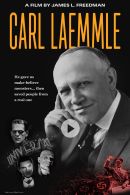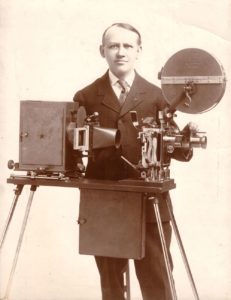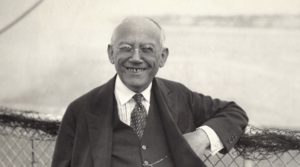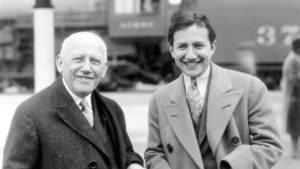 When Carl Laemmle founded Universal Pictures in 1912, one of Hollywood’s longest running and most powerful studios was launched, with their land, Universal City, being dedicated three years later in the San Fernando Valley. Laemmle presided over the studio and facilities until 1936 when he lost everything—the production, distribution, and exhibition enterprise, plus the lot, all due to financial misfortune. However, when Laemmle ran Universal, he engaged in heroic operations that few knew about outside of the company.
When Carl Laemmle founded Universal Pictures in 1912, one of Hollywood’s longest running and most powerful studios was launched, with their land, Universal City, being dedicated three years later in the San Fernando Valley. Laemmle presided over the studio and facilities until 1936 when he lost everything—the production, distribution, and exhibition enterprise, plus the lot, all due to financial misfortune. However, when Laemmle ran Universal, he engaged in heroic operations that few knew about outside of the company.

Now, filmmaker James L. Freedman has released a documentary, aptly entitled Carl Laemmle, which explores the man and his achievements in both filmmaking and humanitarianism. After exploring various subjects for his next film, Freedman came upon an article about the conflict undertaken by early film producers, Laemmle included, who feuded with Thomas Edison and his Motion Picture Patents Company. Edison’s ‘Trust’ began in 1908 and led Laemmle and Paramount founder Adolph Zukor, among others, to relocate in Southern California.

As a self-proclaimed “research nut,” Freedman went on what he termed a “big scavenger hunt” in discovering new information about Laemmle, who Universal devotees nicknamed ‘Uncle Carl.’ “I do a deep dive in,” Freedman said of his research methodologies. “You go to look up one thing, and, ten things later, you are 100 things away from your original source. I just find what interests me and hope it interests other people. I had never heard of this story.”
Among the revelations that Freedman unveiled about Laemmle was one that is largely unknown to this day: in the mid-1930s, Laemmle helped people emigrate from Nazi-led Germany to the United States, where many lived in dwellings at Universal City. Of note, Laemmle often paid both emigration and immigration fees and obtained special exceptions for those fleeing the Nazis by naming the escapees Universal Pictures’ employees. “I was completely blown away when I saw how he rescued these refugees,” Freedman confessed. “He’s a real American hero. How did this guy’s life story fall through the cracks of history? I wanted to share it with the world. In times like today, what better time to make a documentary about an immigrant?”

Indeed, Laemmle himself had left Laupheim, Germany for the United States in 1884 at the age of 17, eventually settling in Chicago before coming to California to establish a film empire. When he learned of Adolph Hitler’s ascension, Laemmle sought to legally facilitate others in leaving his homeland. In tribute to Laemmle, a museum in Laupheim now stands, displaying photographs and documentation about Laemmle’s efforts. One of a very few individuals who told Laemmle’s groundbreaking story—outside of the world of cinema—the late German historian, Udo Bayer, worked with the museum and even wrote a book about Laemmle entitled Carl Laemmle—Von Laupheim nach Hollywood [Carl Laemmle—From Laupheim to Hollywood].
To fortify a documentary about a person who has been deceased over 80 years (Laemmle died in 1939), Freedman licensed footage from the Library of Congress and the National Archives. “The footage was a primer on the history of Hollywood in the early days,” said Freedman, whose film offers numerous surprises about Laemmle, whose son, Carl Laemmle, Jr., was named head of production in 1929 but also lost his position in 1936. Alas, Carl Laemmle, Sr. was the driving force of Universal Pictures, and singular in his altruistic endeavors, according to Freedman, including Laemmle writing letters of plea to Franklin D. Roosevelt on behalf of German Jews. “He fought our own U.S. government and the Nazis to save these people. That spirit is so attractive and wonderful—the man did so much.”

In constructing the film Carl Laemmle, Freedman spent a year in the research phase, another year accumulating footage, photos, and other media, and a third year editing the works into a comprehensive whole. Due to the nature of the material, Freedman received a grant from Steven Spielberg’s Righteous Persons Foundation and worked with The USC Shoah Foundation, which chronicles the experiences of Holocaust survivors.
Ultimately, Carl Laemmle presents a complete picture of a multi-dimensional figure who accomplished even more than making films and assisting refugees; Laemmle the movie mogul also provided women with unique opportunities in the earliest years of silent filmmaking at Universal Pictures. “It speaks so much to what’s going on today,” said Freedman of Laemmle’s willingness to put women on equal footing as men at his studio. “Here’s this guy doing it 100 years ago. He paid [director] Lois Weber in 1918-1920 more than anyone on his lot. People who don’t know history are doomed to repeat it.”
To learn more about this film, please link to www.carllaemmlethefilm.com.





